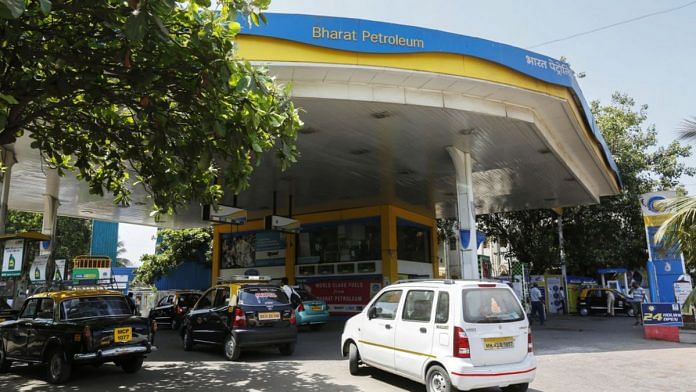New Delhi: Last week, the Narendra Modi government announced that it would sell its 53.29 per cent stake in the Bharat Petroleum Corporation Limited (BPCL), among other firms, to give a push to its disinvestment policy.
But this isn’t the first time the central government has put BPCL on the block — the NDA-1 government headed by Atal Bihari Vajpayee had decided to privatise both BPCL and another state-owned oil firm, Hindustan Petroleum, in 2003. But its plans were thwarted by a Supreme Court order, which mandated parliamentary approval for the move.
In 2016, however, the Modi government quietly did away with the legal roadblock, paving the way for the disinvestment of BPCL now.
ThePrint traces how this happened.
2003 Supreme Court order
The Vajpayee government’s cabinet committee on disinvestment took an in-principle decision to privatise HPCL and BPCL in February 2002. However, then-petroleum minister Ram Naik registered his opposition to the sale of strategic PSUs, as did defence minister George Fernandes. The decision was then postponed for three months in September 2002.
In December 2002, a compromise formula was evolved, with disinvestment minister Arun Shourie informing Parliament that HPCL would be sold to a strategic partner, while there would be a public issue for BPCL.
Later, Attorney General Soli Sorabjee also submitted a report stating that there was no need for Parliament’s approval for disinvestment in the two firms.
However, the Supreme Court struck down the decision in September 2003. The court was hearing two petitions, including one filed by the Centre for Public Interest Litigation (CPIL), questioning the government’s decision to sell majority shares to private parties.
The CPIL had asserted that the government’s decision was contrary to the provisions of the laws that had nationalised these companies — the ESSO (Acquisition of Undertaking in India) Act, 1974, the Burma Shell (Acquisition of Undertaking in India) Act, 1976, and Caltex (Acquisition of Shares of Caltex Oil Refining India Limited and all the Undertakings in India for Caltex India Limited) Act, 1977.
The preamble of these laws stated that the oil distribution business should be vested in the state, CPIL pointed out.
Ruling in CPIL’s favour, the Supreme Court said the government could not be allowed to proceed with privatisation (i.e., reduce its direct or indirect ownership below 51 per cent) without amending the concerned laws.
The bench, comprising Justice S. Rajendra Babu and Justice G.P. Mathur, noted that the preamble to the laws clearly stated that the acquisition was being done “in order to ensure that the ownership and control of petroleum products, distributed and marketed in India by the said company, are vested in the State and thereby so distributed as best to subserve the common good”.
The court said if the laws intended that the undertaking vested in the government company could be transferred, wholly or partly, to any company other than a government company, the law would’ve specified that.
“We find that on the language of the Act such a course is not permissible at all,” it ruled.
Also read: India has met its disinvestment target only once in the last 10 years
The 2016 repeal
The Modi government took a cue from the 2003 Supreme Court order and quietly repealed the laws nationalising the companies, as part of the Repealing and Amending Act, 2016, which repealed 187 obsolete and redundant laws lying unnecessarily in the statute books.
The Repealing and Amending Act was brought in pursuance of the Law Commission’s 251st report, released in November 2014. This report had suggested the repeal of several nationalisation laws that were later formed into PSUs, asserting that these laws do not serve any purpose with respect to the nationalised entity.
However, the report had suggested that “as a matter of abundant caution”, a study of all nationalisation acts be undertaken before they are repealed, and if necessary, a ‘savings clause’ be provided in the repealing act, to limit the scope of the repealing act.
Far from exercising this “abundant caution”, the repealing act was passed quietly, without being referred to a Parliamentary Standing Committee, after a 50-minute-long debate in the Lok Sabha and a 20-minute debate in the Rajya Sabha.
Also read: Privatisation comes to the rescue of Modi govt, but accompanied by political risk




Heading is provocative. Mischievous.